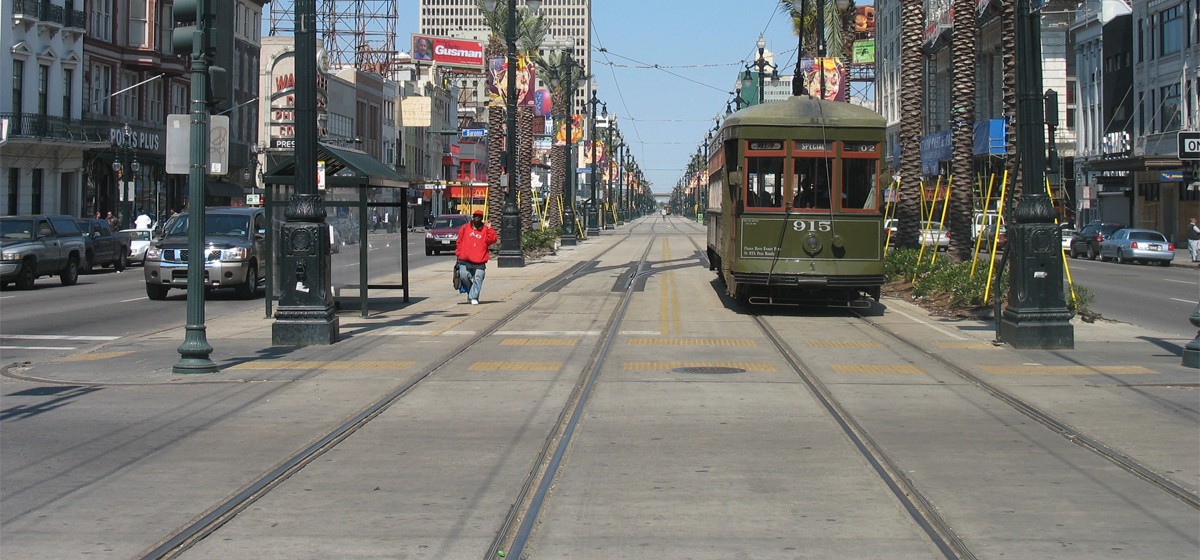March 16, 2018 – Katherine Sayre and Richard Webster
After learning of a homeless man in a wheelchair who’d been cited around 60 times for aggressive panhandling, failing to appear in court and other misdemeanors, New Orleans Councilwoman Stacy Head argued at a hearing last year that the man — and others like him —should be locked up and forced to see a judge.
“I represent the whole city, and there is not one part of the city that’s not upset about the aggressive solicitation, the aggressive panhandling, the being urinated on,” Head said during a Sept. 19 hearing on municipal court funding. “At some point, we’ve got to decide: Who do we value the most? And if you have been harassed 60 times by the same person, at some point, we as a society have to start saying, we cannot have this anymore if we are going to have any semblance of a civilized society.”
The man’s name was Michael Stacker. Unbeknownst to Head or the council, the 59-year-old had died six days earlier, one of at least 60 homeless men and women who died in New Orleans in 2017, according to a new count cataloguing their deaths.
The troubled lives of Stacker and other homeless people who died in 2017 often involved a cycle of emergency room visits and jail bookings, as mental illness and substance abuse persisted to the end, advocates say. The most frequent causes of death were drug overdoses.
The frustration that Head voiced at the hearing last fall is illustrative of the debate taking place in cities across the country, about how to respond to so-called “frequent fliers” of the healthcare and criminal justice systems who are homeless. Officials are juggling multiple concerns: the safety of residents; the health and well-being of homeless people; and the high cost of emergency room treatment and incarceration.
New Orleans’ answer is a new, 100-bed homeless shelter scheduled to open later this spring on the second-floor of the old Veterans Administration hospital downtown, on Gravier Street. The facility is called a low-barrier shelter, referring to the lack of a sobriety requirement, entrance fee or minimum stay. There are no religious expectations or forced morning departures that other overnight shelters require. Access will be 24-7.
Although generally viewed as a positive a step, some worry the new shelter’s success will be limited because it plans to open without accessible substance abuse and mental health services at the same location – a one-stop-shop approach that has succeeded in San Antonio and Houston. Without those services, some think New Orleans’ new shelter could become just a place to sweep homeless men and women out of the view of tourists and locals.
The development of the shelter during Mayor Mitch Landrieu’s administration started as a discussion about creating a sobering center to divert drunk but mostly harmless people from jail. The plan was also to establish a medical detox clinic for drug and alcohol addicts starting sobriety, and a mental health crisis center.
Mayor-Elect LaToya Cantrell, who as a City Council member was part of the initial effort to develop the shelter, said she doesn’t know why the mental health and substance abuse components weren’t ultimately included in the shelter construction. She said as the planning process moved forward, she was no longer included in the discussion.
Cantrell, who takes office in May as the shelter opens, said she plans to add expanded mental health and substance abuse facilities at or near the shelter, in her first year in office.
“I worked on this for three years, and the scope was to have all of these services provided in one location,” she said. “For me, it’s not at the scale that I would like.”
New shelter’s staff will include social workers and nurses
There were an estimated 1,301 homeless people in New Orleans and Jefferson Parish last year, according to an annual count by UNITY of Greater New Orleans. That included 776 people who were homeless but sheltered and 525 who were not in shelters. Most of the homeless were individuals, although there were 135 homeless families, all but eight having found shelter.
The Landrieu administration, in response to a request for an interview, issued a written statement, saying the city has been working with more than 60 homeless service providers to try to end homelessness. That work includes creating the low-barrier shelter.
“It is at this facility where homeless individuals, especially those who reside under the expressway, can be effectively engaged, assessed, triaged and sheltered, while case managers pursue permanent housing,” the statement says. “Homeless clients staying at the shelter will not be limited to short term stays as is the case for many traditional shelters, as it often takes weeks or months for case managers to connect them with permanent housing.”
The city and the Downtown Development District each contributed $1 million to build the low-barrier shelter in the former VA hospital, which now belongs to the city. The Ernest N. Morial Convention Center, the Downtown Development District and the city have agreed to share $1.5 million in annual operating costs: $750,000 from the city, $500,000 from the DDD and $250,000 from the Convention Center.
At any given time, the shelter will have six to eight people on duty, including social workers, nurses and other staff. It’s located one floor above a day shelter and medical clinic that includes an office of the city’s Healthcare for the Homeless.
The 12,000-square-foot shelter will include living space, restrooms, showers, a kitchen, an exterior deck with storage lockers and office space for the shelter operator and service providers, according to the mayor’s office.
To run the shelter, the city selected a 30-year-old housing nonprofit, The Start Corp., which was founded in Houma and began work in New Orleans after Katrina, including several programs within UNITY of Greater New Orleans. Start Corp. executive director Casey Guidry said he is working with organizations like Odyssey House, Catholic Charities and Southeast Louisiana Legal Services to connect them with shelter residents based on their health care and legal needs.
The goal, Guidry said, will be to place homeless people in housing within 30 to 60 days, although that time will vary.
“I think that shelter is one piece of it,” Guidry said. “But the connection to the resources is going to be a really big piece, and I think will help us not just to shelter people but to really help them as they progress out of homelessness.”
Catholic Charities’ Health Guardians program intervenes with frequent emergency room users, many of them homeless, by getting them to doctor’s appointments, filling prescriptions and helping find counseling and transitional housing, among other assistance. One of the program’s “patient navigators,” a licensed social worker, will be assigned to the low-barrier shelter when it opens.
Ben Wortham, Health Guardians program director, said one of the problems with homeless services is that a person’s care plan might involve different providers scattered around different locations. The shelter has the potential to be a centralized hub.
“When you ask somebody who is homeless, ‘Why do you use the ER over and over again?’ Usually the response is, ‘Because it’s simple and it’s easy,’” Wortham said.
How San Antonio built a model for success
San Antonio has established itself as a nationwide model for lifting people out of homelessness with a sprawling campus of housing, health care and substance abuse treatment called Haven for Hope. The project has drawn interest from elected officials and journalists from across the U.S. Among those in recent years was now Mayor-Elect Cantrell.
Haven for Hope opened in 2010 with a 24-hour low barrier shelter entered through a courtyard that connects to other services and nonprofits on site. Haven for Hope came with a hefty price tag, $101 million, paid for with 60 percent private donations led by philanthropist and energy magnate Bill Greehey, combined with 40 percent from public funds.
Next door to Haven for Hope is San Antonio’s Restoration Center, a multi-faceted hub for addiction and mental health services with detox and a sobering center open 24 hours. Police can bring intoxicated people to “sleep it off” while being watched for any problems — rather than taken to jail. A crisis center offers inpatient psychiatric beds 24/7.
Inspired by the San Antonio model, Houston city leaders launched the Houston Recovery Center in 2013. The sobering center was meant to divert drunk people who don’t represent a threat away from jail to a monitored, comfortable place for them to sober up, and, if need be, connect with addiction counseling to break the cycle of repeated arrests.
Houston officers were making 20,000 public intoxication arrests every year in 2010, said Leonard Kincaid, the Houston Recovery Center’s executive director. That was eating up officers’ time and clogging the criminal justice system, he said. The number of people going to jail for public intoxication has since been reduced by 94 percent, he said.
Kincaid said about 70 percent of people who are brought to the sobering center spend a night and never return, while 30 percent make repeated appearances. Staff will work to enroll them in detox and other programs, he said. Kincaid said they do placement, not just referral. The center takes the responsibility of transporting them to services, doing case management and organizing peer support from people who have lived through recovery, for up to 18 months. “We try to meet them where they are,” he said.
Closer to New Orleans, St. Tammany Parish is leading the way on renovating buildings at the now-closed Southeast Louisiana Hospital into a crisis intervention center, a detox unit and a day center with services for the homeless, a project called Safe Haven. The first component will be a daytime drop-in center operated by the local chapter of the National Alliance for the Mentally Ill. The renovation of that facility began in September; the drop-in center is expected to open in the spring.
‘You can’t really talk to a guy about never drinking again if he’s sleeping on Chartres Street’
In New Orleans, a lack of detox beds for Medicaid patients is evidenced by the lines that form outside Odyssey House’s detox facility on North Claiborne Avenue, where alcohol and heroin addicts hope to get one of only 18 spots in the four- to seven-day detox program.
Charity Hospital once offered 100 inpatient psychiatric beds and a crisis intervention unit staffed with doctors and nurses. But that ended with Charity’s closure. The new University Medical Center now has 60 inpatient behavioral health beds and a 26-bed behavioral health emergency room. Meanwhile, Charity Hospital had a 20-bed chemical detox, but those beds were eliminated from its post-storm replacement LSU Interim Public Hospital amid state budget cuts in 2012.
Peter DeBlieux, University Medical Center chief medical officer, said a sobering center would help reduce the burden of treating acutely intoxicated people in UMC’s emergency room, including patients who show up at the ER repeatedly.
“It’s a cost to our community because if I’m seeing that patient in a bed as opposed to that patient being seen in a sobering center, then I’m not seeing somebody who’s got abdominal pain, chest pain, headache, fever pneumonia, heart failure,” DeBlieux said.
Since the hospital opened in 2015, there have only been three occasions in which a bed was open in the inpatient behavioral health so that someone could be taken immediately from the emergency room, he said.
A spokeswoman for New Orleans Emergency Medical Services said there are no plans for EMS teams to bring people to the new low-barrier shelter. That’s likely because the shelter won’t have medical services to triage people. An NOPD spokesman said the scope of NOPD’s interaction with the shelter will be set by the operator’s policies once those are set, and the department’s Homeless Assistance Unit will be taking people to the shelter “when appropriate.”
Odyssey House, meanwhile, is in the process of expanding its services, including developing a 47-bed, medically-supported detox facility and a 100-bed, short-term residential facility in the former Bohn Ford building on South Broad Street.
Ed Carlson, CEO of Odyssey House Louisiana, said the city must do better coordinating care and getting addicts into treatment, including emphasizing treatment in every step of the criminal justice system from police to attorneys to judges.
“If we don’t focus on pushing people to treatment in a coordinated effort, we’re never going to solve our crime problem,” Carlson said. “We’re never going to fix our poverty problem.”
Cantrell said there’s no money yet for a city-run center with crisis intervention, sobering and detox services. Finding the money is part of her transition planning. A location for those services has not been selected, although it will be close to the new low-barrier shelter, she said.
At one point in the years-long debate over the new shelter, Cantrell supported a one-stop-shop style shelter with services at the vacant Temporary Detention Center on Perdido Street, but the idea of placing the homeless shelter so close to the jail didn’t gain traction.
“We can help people across the board. Whether it’s opioids, heroin or crack cocaine, it’s about helping those people,” Cantrell said. “Families are suffering and it has a direct correlation with violent crime. People are suffering. Even petty theft, burglaries, all of it is intertwined.”
Cantrell said she’s also teaming up with Head, the councilwoman, and the Downtown Development District on a public awareness campaign urging people not to give money to panhandlers and instead direct that money to important services.
In NOPD’s 8th District, which includes the French Quarter, Marigny and the Central Business District, officers are testing out a program with the city’s Health Department that could address some of these same issues. The goal is to connect people accused of non-violent, minor crimes with social services, rather than jail. Social workers intervene in cases like public intoxication, loitering, disturbances and lewd behavior, particularly with repeat offenders.
“You can’t really talk to a guy about never drinking again if he’s sleeping on Chartres Street,” explained 8th District Commander Nicholas Gernon.
‘Having stability is huge – and peace of mind’
B.B. St. Roman, the one-person force that is NOPD’s Homeless Assistance Unit, walked through Duncan Plaza across from City Hall on a recent afternoon in search of anyone who might be living there. St. Roman wanted to warn them that the Downtown Development District would be removing their belongings. One man lifted his head up from a bundle of blankets under the park’s gazebo, and St. Roman urged him to pack up.
St. Roman is a familiar, friendly face among the homeless in New Orleans, having worked the streets for 14 years, driving people to appointments for doctor’s visits or getting state ID’s and birth certificates in NOPD’s worn homeless assistance van. Among those she helped was Stacker, who made several trips to hospitals and nursing homes, and who landed in jail at least once in less than two years, according to St. Roman’s records.
After the City Council’s Sept. 19 discussion of municipal offenses and arrests shined a suddenly bright light on Stacker’s case, police in the 8th District launched a search for him, only to discover he had at a local hospital Sept. 13. His body was never claimed, and he was cremated, according to the Jefferson Parish Coroner’s Office. No autopsy was conducted, and it’s not clear why he was taken to the hospital. His family declined to be interviewed.
“Years ago, we were going to try and get him an apartment and the landlord took one look at him and said, ‘Nope,’” St. Roman remembered. “He was too much of a risk, trying to get up the stairs and falling over.” The landlord, she recalled, said, “I can’t have somebody like that.”
St. Roman said other shelters require the homeless to be in by a certain time in the early evening and out early the next morning with all of their possessions. One shelter charges a $10 fee; another has a 21-night limit after which a person can’t stay there for another 30 nights — all requirements the new low-barrier shelter won’t have.
“Having stability is huge – and peace of mind,” St. Roman said.
Read the original story on nola.com.






